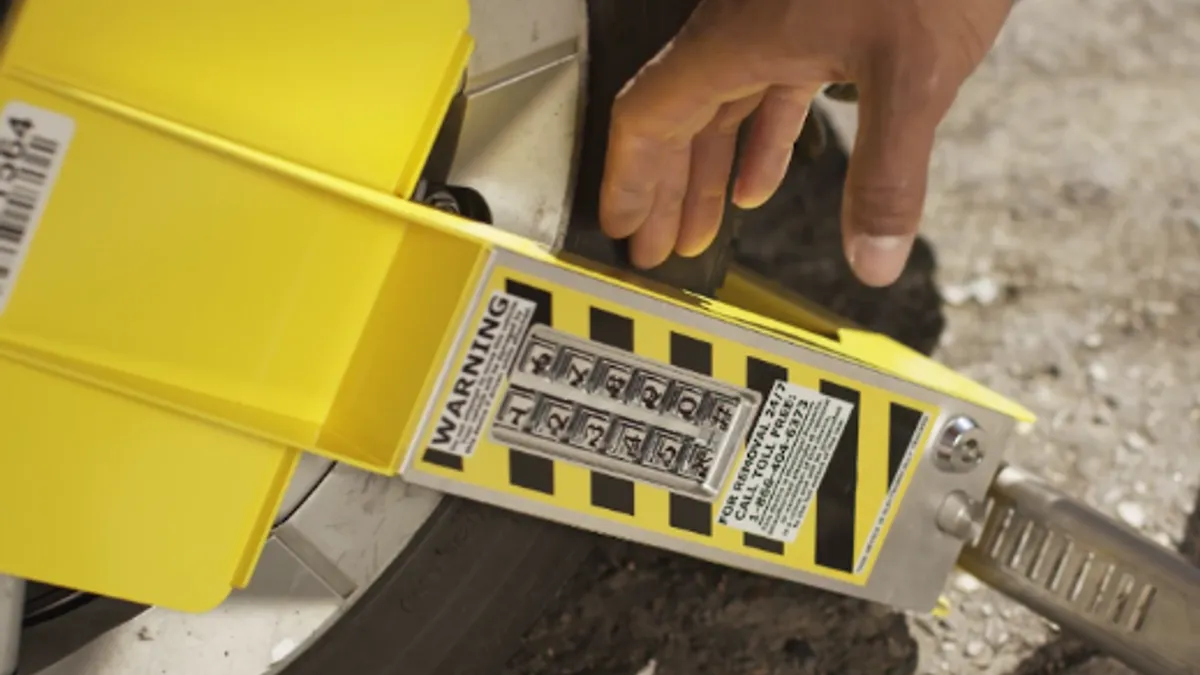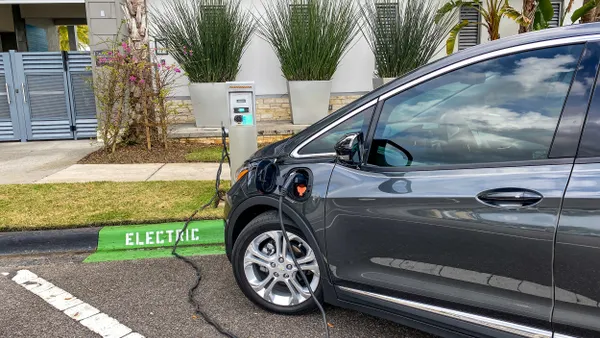Outdated parking enforcement tech is getting the boot in Los Angeles.
Earlier this summer, the Los Angeles Department of Transportation (LADOT) launched a one-year "smart" parking boot pilot to increase enforcement efficiency — after years of towing cars instead of booting them. Parking violators may recognize a familiar yellow device attached to one of their car’s wheels, but the SmartBoot also sports an electromagnetic keypad that adorns the face of the device.
The ticket left on the car includes a number that the violator can call to pay the ticket over the phone, after which they are given a code to put into the keypad on the boot, allowing it to come off on the spot. Before the code is released, drivers have to answer if they can lift 16 pounds, the weight of the boot. If they can’t, PayLock gets a cop to get the boot off for them.
"People have responded a lot more positively to them because they can be on their way," said Oliver Hou, an engineering associate at LADOT. "Instead of three hours, it’s three minutes."
The boot will only be put on cars that have five or more unpaid parking tickets, all of which will have to be paid at once to unlock the device. Violators are told to return the boot within 24 hours to one of four locations throughout the city. If it is not returned, they can be fined $25 fine per day up to the cost of the boot, or $500 — a fee which can add to the already-large pool of funding from parking enforcement. Unpaid parking tickets in Los Angeles added up to $21 million over the last five years. According to NBC Los Angeles, paying those tickets could fill 1 million potholes or hire 300 new city firefighters.
.@LADOTofficial says new self-release boots take 5-10 mins to take off from the time parking violators call to pay their tickets. @KNX1070 pic.twitter.com/E0XxPAgIFr
— Cooper Rummell (@KNXCooper) July 26, 2017
The SmartBoot, built by PayLock, had its first program in Hoboken in 2003. Since then, the boot has been used in 20 municipalities, counties and colleges and used over 400,000 times in the past 10 years. Beside manufacturing the device, PayLock runs a help center for people to call in with their ticket number for payment assistance. The company can three-way connect friends and family to the call to help complete multiple electronic methods of payment.
Matt Silverman, executive vice president at PayLock, said that the SmartBoot allows cities to find middle ground between being aggressive about going after unpaid tickets and not going after violators at all.
"We are changing the status quo of how cities can treat people," he said.
Within days of the launch, NBC Los Angeles reported at least one SmartBoot was found on a wheel discarded at a tow truck yard. "Nothing is foolproof," Hou said. "No boot is going to fit 100% of vehicles.”
However, according to Silverman, PayLock has found that their boots are less likely to be vandalized than a traditional boot.
"People have an option that they didn’t have it before," Silverman said. "You change the decision making model in people’s mind."
Getting rid of a boot, regardless if it’s smart or not, is a time-honored tradition. Youtube is full of videos and the web has tutorials showing how to remove boots from cars.
"People always find a way," Hou said.
PayLock gave Los Angeles 500 SmartBoots for free, but they make revenue by receiving part of the $150 boot fee that Los Angeles charges violators.
Even though parking tickets and boots are usually things that aggregate drivers, PayLock still cares what their users think.
"You can call us crazy but we we send out a customer satisfaction survey," Silverman said. "We get some interesting comments."
For Los Angeles, even with a discarded boot or two, the program seems to be working. Since launch, LADOT has done over 973 boot applications, 305 tows and has brought in over $281,000. The program has collected over 1,863 parking tickets, and LADOT will evaluate next summer if they would like to continue using the technology.











